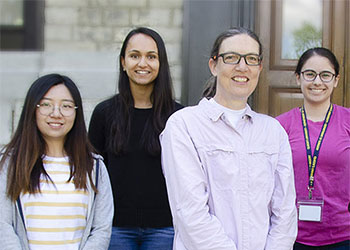
On Feb. 11, Queen’s will recognize the United Nations’ International Day of Women and Girls in Science by encouraging the campus community to share their passion for STEM by sharing their research contributions on Twitter and tagging @queensuResearch.
Queen's University Library celebrates International Day of Women and Girls in Science by honouring some of our own groups...

Women have faced significant obstacles in STEM careers over time and continue to be under-represented in these industries. According to Engineers Canada, only 18 per cent of working engineers licensed in Canada are women.
The goal at Women in Engineering is to increase both the number of women pursuing engineering and the retention of existing women in the field.

Women in Science Queen’s (WiSQ) is supported by the Employee Resource Group funded by a Inclusive Community Fund (ICF) provided by the Human Rights and Equity Office.
Founded by Dr. Patricia Lima, adjunct assistant professor in the Queen’s Cardiopulmonary Unit (QCPU), who was looking to help other women as they explore and build upon their careers at Queen’s while at the same time helping foster equity within science. Other goals include promoting discussions about gender bias in science; incentivizing the active participation and leadership of women; and establishing a visible, equitable, diverse and inclusive community promoting the development and retention of women across all scientific disciplines.

Queen’s University’s Women in Science and Engineering (WiSE) is a student-run organization that works to promote the involvement of women in science and engineering related disciplines. We aspire to provide networking and mentorship opportunities for Queen’s University students as well as fostering enthusiasm for science and engineering in the Kingston Community through our outreach programs.
"Science and gender equality are both vital for the achievement of the internationally agreed development goals, including the 2030 Agenda for Sustainable Development. Over the past 15 years, the global community has made a lot of effort in inspiring and engaging women and girls in science. Yet women and girls continue to be excluded from participating fully in science.
At present, less than 30 per cent of researchers worldwide are women. According to UNESCO data (2014 - 2016), only around 30 per cent of all female students select STEM-related fields in higher education. Globally, female students’ enrolment is particularly low in ICT (3 per cent), natural science, mathematics and statistics (5 per cent) and in engineering, manufacturing and construction (8 per cent).
Long-standing biases and gender stereotypes are steering girls and women away from science related fields. As in the real world, the world on screen reflects similar biases—the 2015 Gender Bias Without Borders study by the Geena Davis Institute showed that of the onscreen characters with an identifiable STEM job, only 12 per cent were women.
In order to achieve full and equal access to and participation in science for women and girls, and further achieve gender equality and the empowerment of women and girls, the United Nations General Assembly adopted resolution A/RES/70/212 declaring 11 February as the International Day of Women and Girls in Science." - United Nations
See this United Nations page for more information and ways you can participate.